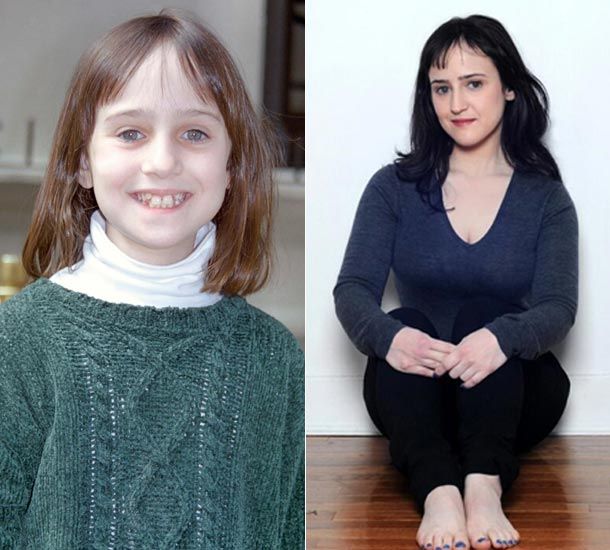I did some research and found an article written by my other favorite child actress, Mara Wilson. She is proof that not all child actors decide to make bad choices. For those of you who don't know her, Mara Wilson started as a child actress (I know her best for her starring role in Matilda) and once she started growing up, she left hollywood. The article she wrote was titled, "7 Reasons Child Stars Go Crazy (An Insider's Perspective)". She made a lot of good points and it was very interesting to read about.
For Instance, one of the things she wrote about was the parents of the child who is acting. This is something I have wondered about as well. Sometimes it's not the actor's fault, but the parents. Mara explained that when she was little and she decided to start acting, her parents tried their best to change her mind. They were very protective of her, and this probably saved her from getting too pulled into the acting life. Many child stars go into acting because their parents want them to, and it's not the choice of the child themself. Then when they turn 18 and are declared an adult, they can make decisions for themselves rather than for their parents, and they can make bad mistakes.
Also, being in an acting career means that throughout your entire life, people will be just waiting for you to make a mistake, observing your every flaw. That's enough to drive anyone crazy. Child actors who continue acting until they are adults never have a chance to go through a rebellious stage in their life. Almost all teenagers have a point in their life when they question things and make mistakes, but then learn from those mistakes and become a much better person. Well, would you want to rebel like that with a million eyes watching your every move? I didn't think so. Therefore, young actors miss out on that part of life, so they can't help rebelling at a later point in their lives, which causes mass consequences.
Another point Mara brushed on was the truth that child actors get used to the attention and then they lose it all. By growing up in such an environment as acting, many children get spoiled. They get used to so many people paying attention to them and they love it, so they keep on acting and forget about the reason they were acting in the first place. They forget about their love of acting and focus in on the people who want them to act. And eventually, those people lose interest in them. And then they don't know what to do with their lives. They don't know if they should take up a different career or if acting is all they really know how to do. So, many young actors do things that they will later regret in a state of confusion. Mara gives the advice that all child actors should get out of the business as soon as possible to avoid corruption.
The #1 reason that child stars go crazy, in Mara's opinion, is that they can't escape it. She only acted when she was a little girl and sees it as an old hobby, but people still recognize her as the girl who was in Mrs. Doubtfire or as the girl who played Matilda. She has a different life, but many people can't seem to grasp that. Once a child gets into the acting life, it is incredibly hard to leave. Imagine if Miley Cyrus had suddenly decided to quit acting in the middle of filming Hannah Montana episodes. A lot of young girls would be furious and the producers would not be happy. Young actors also have to put into account the feelings of their fans. Once you are involved in acting, it's nearly impossible to escape.
There are many more reasons as to why so many young actors do what they do. I only elaborated on a few of the reasons. There are many factors to be taken into account with the question of why child stars go crazy. I guess what gets me is the number of them that make huge mistakes. If it were only a few actors who messed up, it wouldn't be nearly as big of a problem. But with the fact that almost every single one of the child actors I grew up with has made terrible life decisions, I can say that this is definitely a problem. Of course, some young actors are able to escape the grasp of the acting life. Some are able to heal from their mistakes and turn their lives around. Others are able to escape it all completely, just like Mara. However, the past will always be there. Even if child actors do stop acting, people remember them. That can be a good thing, but it can also be bad.
This is a picture of young Mara Wilson next to the Mara Wilson of today.
Here is the link to her article:
http://www.cracked.com/blog/7-reasons-child-stars-go-crazy-an-insiders-perspective/








